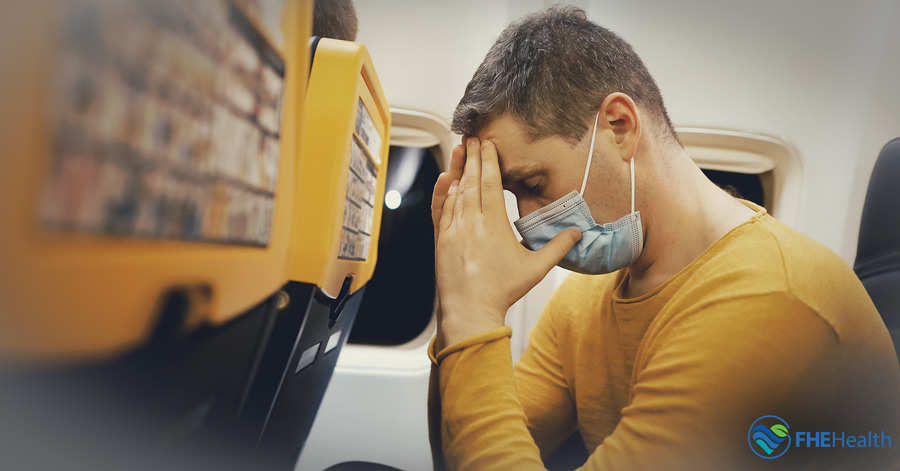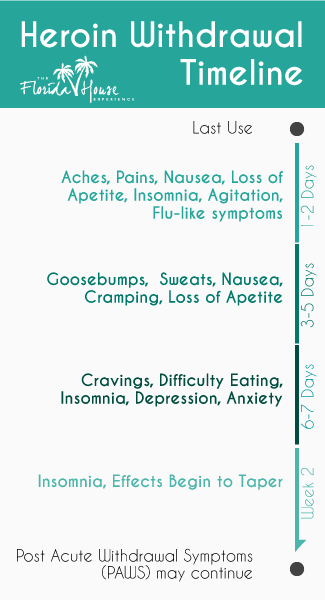
Heroin withdrawal can be challenging, but these tips can help you manage symptoms. Get help with opioid withdrawal symptoms so you can beat your addiction.
Heroin is a highly addictive drug that poses multiple health risks. More than 68,000 people died in 2020 from overdosing on opioid drugs like heroin. It’s essential to break the habit of using heroin so you can live a full, healthy life. However, recovery from heroin addiction can be tough because many withdrawal symptoms occur when you stop using the drug. These opioid withdrawal symptoms must be managed appropriately so you can safely quit heroin and stay sober.
Why Does Heroin Withdrawal Occur?
Heroin is an opiate drug with similar effects on the body to other drugs in that class. Taking heroin causes blood pressure to lower and the heart rate to slow, and respiration may also be suppressed. Users can experience a deep feeling of pleasure and well-being as heroin binds to opioid receptors in the brain.
When you stop taking heroin, the effects you experienced while taking it are reversed. For example, you might notice that your heart is racing and you feel depressed or anxious. These effects fade over time as your body returns to functioning normally without heroin.
Tips for Handling Heroin Withdrawal
No one should have to go through heroin withdrawal on their own. The following tips can help you get appropriate support and manage your symptoms.
Use a Medical Detox Program
Medical detox programs provide medication to reduce the symptoms of heroin withdrawal and help you manage cravings.
- Lofexidine is a non-opioid, FDA-approved medication designed to reduce the intensity of opioid withdrawal symptoms.
- Buprenorphine and methadone are drugs that bind weakly to opioid receptors in the brain, reducing cravings and symptoms without providing the same high as heroin.
- Naltrexone blocks opioid receptors so you can no longer get high from taking heroin.
It’s important to have medical supervision while taking these medications. Contact a medical detox facility that can design a detox program suitable for your individual needs.
Get Emotional Support
Heroin withdrawal can bring up a lot of difficult emotions. Many people find it enormously helpful to have professional emotional support during this time. Rehabilitation centers provide access to counselors and therapists who can help you work through your feelings. Therapists can teach you methods for dealing with your emotions without using drugs. You can also explore your thoughts about heroin usage and break harmful patterns of thought that could lead you to relapse in the future.
Establish a Strong Support Network
Friends and family can be invaluable when you’re going through recovery from heroin addiction. It’s important to foster healthy relationships with supportive relatives and friends, rather than shutting them out. However, some people are more likely to impede your progress through recovery than help you on your way. Don’t hesitate to cut off contact with people who encourage you to use heroin or with whom you have relationships that trigger the desire to use opiates.
Stay Hydrated
Dehydration is common during withdrawal. Some opioid withdrawal symptoms, such as diarrhea, cause the body to lose fluids. Thirst can feel very similar to drug cravings, so drinking plenty of water is important to avoid relapsing into heroin usage. In a rehabilitation facility, staff can help remind you to stay hydrated.
Eat Well
While recovering from addiction, nourishing your body with a balanced and nutritious diet is important. The body needs proteins, minerals and vitamins to repair the damage caused by heroin. It’s also common for people suffering from addiction to have vitamin or mineral deficiencies. A healthy diet can address these deficiencies and support your overall health during this crucial time.
Be Physically Active
Exercise can be enormously helpful during long-term heroin addiction recovery. Exercise releases endorphins into the brain, which are hormones that create a feeling of well-being. In this way, exercise can relieve anxiety, stress and restlessness. Exercise also helps many people sleep more easily, which can help combat insomnia associated with recovery. Over the long term, regular exercise can help repair the damage to the heart and circulatory system that heroin can cause. Many people find they enjoy exercise and that it helps them build a life without heroin. Studies show that exercise programs can be a useful treatment for opiate addiction recovery.
Maintain healthy communication:
It is important to remember that you are not the only one dealing with heroin addiction. Addiction, recovery, and treatment involves all of your family and friends. They are the people that care the most about you in the entire world and want nothing more than to see you overcome your addiction. Rehabilitation would not be complete without having open and constant channels of discussion with not only them but counselors and therapists as well. Speaking by itself is a form of treatment because it allows you to verbalize everything you are feeling and experiencing during withdrawal. You can get second opinions and establish ways of dealing with emotions through talking. However, you must never prolong toxic relationships with individuals that may have triggered your drug use in the first place or impede your progress.
What Is an Opioid Taper?
Heroin, like other opiates, is a physically addictive substance, meaning withdrawal symptoms can occur after you stop using the drug. Opioid withdrawal symptoms can begin within hours of the last drug use. The worst symptoms of heroin withdrawal occur within a couple of days of stopping use, and they gradually subside over about a week.
After the acute period of heroin withdrawal, some people continue to experience post-acute withdrawal symptoms (PAWS). These symptoms are typically milder and can be managed with an appropriate treatment plan and support.
Opioid Withdrawal Symptoms
The symptoms of opioid withdrawal typically develop according to the following timeline.
1–2 Days
- Aches and pains
- Nausea
- Loss of appetite
- Agitation
- Flu-like symptoms
3–5 Days
- Sweats
- Nausea
- Goosebumps
- Loss of appetite
- Cramping
6–7 Days
- Difficulty eating
- Cravings
- Anxiety
- Insomnia
- Depression
7–14 Days
- Symptoms usually start to taper
- Insomnia may persist
Some other symptoms that may occur during withdrawal include diarrhea, restlessness, and seizures. It’s important to get support during withdrawal to ensure you stay safe.
Some people continue to experience withdrawal symptoms for several months after quitting heroin. Although these symptoms are typically not as severe as during the acute withdrawal period, they may require professional treatment and support to manage.
Morphine withdrawal symptoms are very similar to those of heroin withdrawal. Both these drugs are opiates and therefore highly addictive. More than 2 million people misuse opioid drugs such as morphine and heroin in the United States.
Treatment for Heroin Addiction
Quitting heroin can be difficult due to opioid withdrawal symptoms, but it is possible. Getting the right treatment can make managing heroin withdrawal much easier. Our treatment programs provide medical, emotional and other forms of support to help you get through withdrawal and quit heroin for good. If you’re struggling with heroin addiction or want to seek help for a loved one, please contact us at FHE Health today.
Heroin is an illegal and highly addictive drug processed from morphine, which is naturally derived from the seeds of poppy plants. Heroin addiction has increased over time and it is imperative that the issue be addressed immediately and users aided in the process of recovery. However, heroin withdrawal is difficult to undergo, making the drug quite hard to quit. People must be informed about the impacts of heroin on their health and the need to get sober, in addition to what to expect from withdrawal and the tools they can utilize during treatment.
Symptoms of Heroin Withdrawal
 Curbing heroin addiction is not an easy task.
Curbing heroin addiction is not an easy task.
Rates of relapse are relatively high as users are often ill-equipped to deal with the uncomfortable phases of withdrawal. Frequently they are trying to quit on their own without knowing what lies ahead.
Withdrawal from heroin addiction is fast acting
and may begin within hours the drug was last used. More extreme symptoms usually peak between a day or two and takes about a week to gradually subside. Florida House believes there needs to be a greater awareness of the signs of withdrawal to better cope and they include:
- Restlessness
- Seizures
- Muscle and bone pain
- Insomnia
- Diarrhea
- Vomiting
- Abdominal cramps
- Cold flashes with goose bumps (“cold turkey”)
- Uncontrollable leg movements (“kicking the habit”)
Withdrawal varies individual to individual and is dependent on the amount of substances taken. Some may experience lasting signs of withdrawal for several months after having taken the drug. Others may develop heroin use disorder due to continued use of the drug. Heroin use disorder is a chronic disease where those struggling with heroin addiction fall into a long-term pattern of relapse. They have an uncontrollable craving for the drug and will obtain it by any means necessary. It becomes the singular purpose of their lives and demonstrates the necessity to quit immediately before waiting for withdrawal to worsen.
No matter how one administers heroin, the drug remains extremely addictive. Injection and smoking, however, get it faster to the brain than other methods and so heroin use disorder is more common if the drugs are used in that way.
Heroin is an opiate drug as it is derived from morphine which comes from the seeds of poppy plants. When used it suppresses blood pressure, respiration, heart rate, and the regulation of body temperature due to its tendency to depress the central nervous system. It gives individuals a feeling of euphoria upon binding to opioid receptors in the brain. Increased doses of heroin leads to greater feelings of pleasure, hence the prevalence of heroin addiction where addicts are constantly trying to replicate their highs. When withdrawal takes place, the effects of heroin are completely reversed. The user can experience depression, rapid heart rate, and anxiety. There may even be respiratory complications if one chose to smoke it. But after months or years have gone by without doses of heroin, the withdrawal begins to fade significantly.
Getting Treatment for Heroin
While the withdrawal symptoms of quitting heroin are difficult, Florida House knows that sobriety is not only entirely possible, it has been accomplished by many others before you. Treatment and support are readily available at all our locations and with proven detox programs. If you or someone you know is struggling with heroin addiction, please speak with a member of our team of highly trained and compassionate individuals at (833) 596-3502 for further help.






